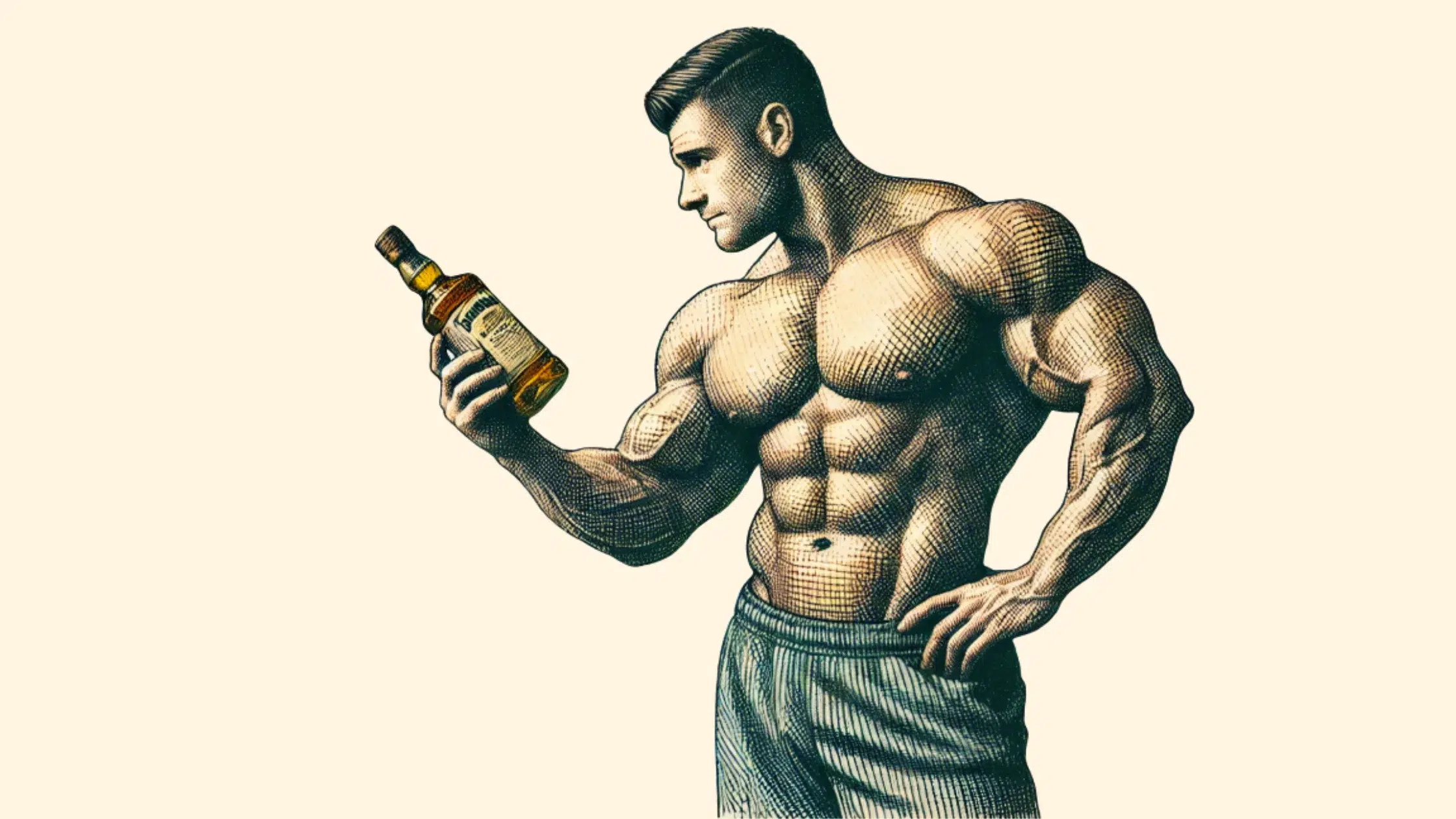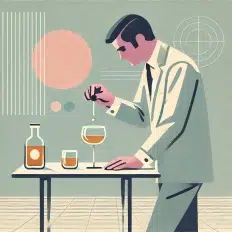Ever wondered if you can enjoy a glass of whiskey without throwing off your bodybuilding goals? You’re not alone.
Whiskey, like all alcoholic drinks, comes with its share of concerns when it comes to building muscle and staying fit. It’s all about the calories and how alcohol can mess with muscle growth and recovery. But does that mean you have to give up on whiskey entirely to keep those gains coming?
Not necessarily. This article dives deep into how whiskey affects bodybuilding, from its calorie content and impact on muscle repair to how it might mess with your hydration and testosterone levels. We’ll also explore if there’s a way to enjoy whiskey without derailing your fitness goals.
So, grab a seat (and maybe a glass – in moderation, of course) as we break down what bodybuilders need to know about drinking whiskey. Cheers to learning how to balance pleasure and gains!
What is the impact of whiskey on bodybuilding?
Whiskey, like other alcoholic beverages, can significantly impact bodybuilding efforts and overall fitness goals. The primary concern lies in its calorie content and the way alcohol metabolism can interfere with muscle growth and recovery. Whiskey is calorie-dense, providing 7 calories per gram, which can contribute to unwanted fat accumulation if consumed in excess and not accounted for within a daily caloric intake.
This can be particularly counterproductive for bodybuilders who are in a cutting phase, trying to shed fat while preserving muscle mass. Moreover, the metabolism of alcohol takes precedence over other macronutrients in the body, which can hinder the process of muscle repair and growth. Alcohol consumption has been shown to decrease protein synthesis, a critical process for muscle recovery and growth, making it challenging for bodybuilders to gain muscle efficiently.
Additionally, whiskey can impair testosterone levels and hydration, both of which are crucial for optimal muscle function and growth. For bodybuilders, moderation is key. While an occasional drink may not have a drastic negative effect, regular consumption can impede progress by affecting muscle growth, recovery, and overall body composition.
Understanding these impacts can help individuals in the bodybuilding community make informed decisions about alcohol consumption in relation to their fitness goals and health.
How does alcohol consumption affect muscle growth?
Alcohol consumption can significantly hinder muscle growth and repair, primarily due to its effects on protein synthesis and testosterone levels. Studies have shown that alcohol can decrease protein synthesis by up to 20%, a critical process for muscle recovery and growth, making it challenging for bodybuilders to gain muscle efficiently. Moreover, research indicates that testosterone levels can drop by as much as 25% after acute alcohol consumption, which are crucial for muscle development.
This reduction in testosterone not only affects the body’s ability to build muscle but can also lead to longer recovery times and decreased overall performance. For bodybuilders aiming to maximize muscle gains, understanding the detrimental effects of alcohol on these key biological processes is critical. Moderating alcohol intake, or avoiding it during critical training periods, can help in achieving optimal muscle growth and fitness levels.
Alcohol impairs protein synthesis, essential for muscle repair.
Alcohol consumption directly impacts the body’s ability to repair and build muscle by impairing protein synthesis. This process is critical after physical exertion, as it helps in the recovery and strengthening of muscle tissues. When alcohol is present in the system, the body prioritizes metabolizing it, which can significantly slow down the repair process.
Studies highlight that even moderate alcohol intake can reduce muscle protein synthesis by up to 20%, leading to slower muscle growth and extended recovery times, hindering progress in muscle development.
Alcohol reduces testosterone levels, crucial for muscle development.
Furthermore, alcohol negatively affects testosterone levels, a key hormone in muscle development and overall body composition. Research has demonstrated that alcohol consumption can lead to a significant reduction in testosterone levels, by as much as 25%, which not only hinders the body’s ability to gain muscle mass but also affects energy levels, recovery speed, and can lead to increased fat storage. For individuals focused on building muscle and improving physical performance, minimizing alcohol intake is crucial to maintaining optimal testosterone levels for muscle development.
What are the caloric implications of drinking whiskey?
Whiskey, while enjoyed by many for its rich flavors, carries caloric implications that can impact a bodybuilder’s diet and body composition. With 7 calories per gram, whiskey’s calorie content is purely from alcohol, offering no nutritional value. These calories can quickly add up, leading to unwanted fat gain if not accounted for within a bodybuilder’s carefully managed diet.
Additionally, consuming alcohol can impair judgment and lead to poor dietary choices, further undermining nutritional goals. For bodybuilders striving to maintain a lean physique or lose fat, understanding and moderating whiskey consumption is essential to avoid compromising their fitness objectives.
Whiskey contains 7 calories per gram, affecting fat gain.
Whiskey, devoid of any nutritional benefits, packs 7 calories per gram. These ’empty’ calories contribute to a calorie surplus with ease, especially in social settings where moderation can be more challenging. For bodybuilders, every calorie is accounted for, and the surplus from whiskey can lead to unwanted fat gain, interfering with efforts to maintain a lean physique or achieve fat loss goals.
Alcohol can lead to poor dietary choices, undermining nutrition.
The consumption of alcohol, including whiskey, often impairs judgment, leading to poor dietary choices. This can significantly undermine a carefully planned nutrition regimen, which is essential for muscle growth and recovery. The tendency to opt for high-calorie, low-nutrient foods when under the influence can set back fitness goals, emphasizing the importance for bodybuilders to be mindful of their alcohol intake to maintain optimal nutrition.
To illustrate the potential for fat gain more vividly, let’s compare the calorie content of whiskey to common foods or meals consumed by bodybuilders:
| Item | Quantity | Calories (Approx.) |
|---|---|---|
| Whiskey | 1 shot (44 ml) | 98 |
| Chicken Breast | 100g | 165 |
| Brown Rice | 1 cup cooked | 216 |
| Broccoli | 1 cup chopped | 31 |
| Whey Protein Shake | 1 scoop (30g) | 120 |
| Almonds | 1 ounce (28g) | 161 |
Can moderate whiskey consumption fit bodybuilding goals?
Moderate whiskey consumption can, in some contexts, be aligned with bodybuilding goals, provided it is carefully managed within the broader framework of an individual’s diet and training regimen. Moderation is key, as it minimizes the negative effects of alcohol on muscle growth, recovery, and overall body composition. To make moderation more practical, consider incorporating whiskey calories into your meal plan as you would any other indulgence.
For example, if you plan to enjoy a glass of whiskey, adjust your daily caloric intake to account for this. A single shot of whiskey typically contains about 70-100 calories, so you might need to reduce the calories from carbohydrates or fats elsewhere in your diet to maintain balance. Adjustments to hydration and diet can help mitigate the impact of the calories and potential dehydration associated with whiskey consumption.
For instance, for every glass of whiskey, increase your water intake by one to two glasses to counteract the diuretic effect of alcohol. Additionally, ensure your diet on days you consume whiskey is particularly rich in nutrient-dense foods to support muscle repair and recovery, somewhat offsetting the potential negative impacts of alcohol on the body’s nutritional balance. For bodybuilders, this means limiting intake to occasional, small quantities and avoiding alcohol altogether during critical training periods or before competitions.
Ultimately, while moderate whiskey consumption may not directly contribute to muscle growth or performance enhancement, it doesn’t necessarily have to derail fitness goals if managed wisely within a balanced lifestyle.
Moderation minimizes negative effects, but does not eliminate them.
Moderation in whiskey consumption can indeed reduce the adverse effects on muscle growth and recovery, yet it does not completely eliminate them. The key is to understand that even small amounts of alcohol can affect the body’s ability to synthesize protein and maintain optimal testosterone levels. Therefore, while moderate drinking may lessen the impact, it’s crucial for bodybuilders to remain aware of any potential setbacks to their fitness goals.
A practical approach is to limit whiskey consumption to occasions that are not close to training sessions, ideally only 1-2 drinks on days you are not training, and always with a mindful eye on overall consumption.
Hydration and diet adjustments can help mitigate impacts.
Proper hydration and strategic diet adjustments are essential for bodybuilders who choose to consume whiskey moderately. Increasing water intake can counteract the diuretic effects of alcohol, helping to prevent dehydration. Additionally, focusing on nutrient-rich foods can support muscle repair and recovery, somewhat offsetting the potential negative impacts of alcohol on the body’s nutritional balance.
Planning your meals to include a higher proportion of lean proteins, complex carbohydrates, and healthy fats on days you consume alcohol can help maintain the body’s anabolic state and support recovery.
Guidelines for bodybuilders drinking whiskey
For bodybuilders considering the occasional whiskey, adhering to specific guidelines can help minimize its impact on fitness goals. Limiting intake to 1-2 drinks on non-training days allows for enjoyment without significantly compromising muscle recovery or growth. It’s also advisable to avoid alcohol 48 hours before intense workouts to ensure peak performance and optimal recovery.
These guidelines aim to balance the pleasure of whiskey consumption with the rigorous demands of bodybuilding, ensuring that progress in the gym is not undone by dietary choices outside of it.
Limit intake to 1-2 drinks on non-training days.
To effectively implement this guideline, consider planning your social events or whiskey tastings around your training schedule. For instance, if your rest days are on the weekend, that would be a more suitable time for a drink, ensuring it doesn’t interfere with your recovery or next day’s workout. Keeping track of your intake through a fitness app can also help maintain awareness and accountability.
Avoid alcohol 48 hours before intense workouts.
Mark your calendar for heavy lifting days or intense training sessions and ensure no alcohol consumption occurs in the 48 hours leading up to these. This practice helps maintain optimal hydration and ensures your body is in the best state for performance and recovery. Sharing your training schedule with friends and family can also help them support your goals by planning alcohol-free activities or gatherings that don’t center around drinking.
Recovery strategies post-whiskey consumption
After indulging in whiskey, bodybuilders have effective strategies at their disposal to minimize its impact on their fitness goals. Increasing water intake is paramount to counteract the diuretic effects of alcohol, aiding in preventing dehydration and facilitating the flushing of toxins from the body. Equally important is focusing on nutrient-rich foods to support muscle repair and recovery.
These strategies are essential for replenishing vital nutrients and providing the energy needed for the body to recover effectively from alcohol consumption.
Increase water intake to combat dehydration and flush toxins.
After consuming whiskey, it’s crucial to increase water intake significantly to combat potential dehydration. Aiming for an additional 16-24 ounces of water above your daily recommended intake can help rehydrate the body and flush out toxins. This step is vital for maintaining optimal bodily functions and ensuring that your training efficiency is not compromised by alcohol consumption.
Focus on nutrient-rich foods to support muscle repair and recovery.
To aid in recovery post-whiskey consumption, prioritizing nutrient-rich foods is key. These foods provide essential vitamins, minerals, and proteins necessary for muscle repair and recovery. Below is a detailed table of foods beneficial for bodybuilders after consuming alcohol, highlighting their key nutrients and recovery benefits.
| Food Item | Key Nutrients | Recovery Benefits |
|---|---|---|
| Salmon | Omega-3 fatty acids, Protein | Reduces inflammation, supports muscle repair |
| Eggs | Protein, Vitamin D, B Vitamins | Aids in muscle recovery, supports hormone balance |
| Quinoa | Complete Protein, Magnesium | Supports protein synthesis, replenishes energy |
| Greek Yogurt | Protein, Calcium | Supports muscle repair, strengthens bones |
| Spinach | Iron, Magnesium, Vitamins A and C | Supports oxygen transport, energy production |
| Sweet Potatoes | Beta-Carotene, Potassium | Supports muscle function, replenishes glycogen |
| Nuts and Seeds | Healthy Fats, Protein | Reduces inflammation, supports muscle growth |
| Berries | Antioxidants, Vitamins | Reduces oxidative stress, supports immune function |
| Watermelon | Water, Lycopene | Hydrates, reduces muscle soreness |
| Chicken Breast | Lean Protein, B Vitamins | Supports muscle repair, energy metabolism |
Incorporating a variety of these foods into meals following whiskey consumption can help replenish lost nutrients and support the body’s healing process, enabling bodybuilders to return to their training regimen with minimal downtime.
How does whiskey affect hydration and performance?
Whiskey consumption can adversely affect both hydration and athletic performance. As a diuretic, alcohol increases water loss, leading to dehydration. This state of reduced hydration can impair physical performance, as optimal fluid balance is crucial for muscle function and endurance.
Studies have shown that even mild dehydration can reduce performance in tasks requiring endurance, strength, and power output, which are critical for bodybuilders and athletes. Furthermore, dehydration can slow down the recovery process, extending the time needed for muscles to heal after intense workouts. Research indicates that proper hydration is essential for facilitating nutrient transport to the muscles, which aids in recovery and growth.
Dehydration can compromise this process, leading to less effective muscle repair and longer recovery periods. For athletes and bodybuilders, understanding the impact of whiskey on hydration is essential to maintain peak performance levels and ensure effective recovery from training sessions.
Alcohol is a diuretic, leading to increased water loss.
Alcohol, including whiskey, functions as a diuretic, prompting the body to lose more water than usual. This increased water loss can quickly lead to dehydration, affecting the body’s overall fluid balance. Maintaining adequate hydration levels is crucial for bodybuilders, as dehydration can significantly impact muscle function and performance.
Studies have demonstrated that a decrease in body water by even 2% can impair physical performance and cognitive functions.
Dehydration can impair workout performance and recovery.
Dehydration, a potential consequence of alcohol consumption, significantly impairs workout performance and the body’s ability to recover. Adequate hydration is essential for optimal muscle function, energy levels, and nutrient transport. When the body is dehydrated, these processes are compromised, leading to diminished performance during workouts and prolonged recovery times post-exercise.
Research supports that hydration status directly affects strength, power, and endurance, underscoring the importance of avoiding alcohol-induced dehydration for athletes aiming for optimal performance and recovery.
Are there benefits to drinking whiskey for bodybuilders?
While whiskey consumption is often viewed through the lens of its challenges to fitness goals, in moderation, it can offer some benefits for bodybuilders. Relaxation and stress reduction are the primary advantages, as moderate whiskey consumption can help in lowering stress levels, which is crucial for recovery and overall mental health. However, it’s important to note that these benefits do not directly contribute to muscle growth or performance enhancement.
Recent studies suggest that moderate alcohol consumption, including whiskey, may have a calming effect on the nervous system, potentially aiding in stress reduction and improving sleep quality in some individuals. For instance, a review published in the Journal of the American Medical Association highlights the potential for moderate alcohol intake to lower cortisol levels, a stress hormone, thereby contributing to relaxation and possibly better recovery in athletes. The key lies in moderation, ensuring that the occasional drink does not counteract the efforts put into training and nutrition.
Ultimately, while whiskey can be enjoyed as part of a balanced lifestyle, its benefits for bodybuilders are more related to psychological well-being rather than physical performance improvements.
In moderation, whiskey can help with relaxation and stress reduction.
Consuming whiskey in moderation can contribute to relaxation and stress reduction for bodybuilders. This psychological benefit is significant as it aids in recovery by lowering stress levels, which can indirectly support muscle repair and growth by improving overall well-being and sleep quality. It underscores the importance of mental health alongside physical health in the pursuit of fitness goals.
Engaging in responsible drinking, as part of a balanced lifestyle, may offer these psychological benefits without negatively impacting fitness achievements.
No direct benefits to muscle growth or performance enhancement.
It’s crucial to understand that whiskey offers no direct benefits to muscle growth or performance enhancement. While it can aid in relaxation and stress management, these effects do not translate into increased muscle mass or improved athletic performance. Bodybuilders should be mindful of this distinction, recognizing that any alcohol consumption must be carefully balanced within a lifestyle dedicated to achieving peak physical condition.





